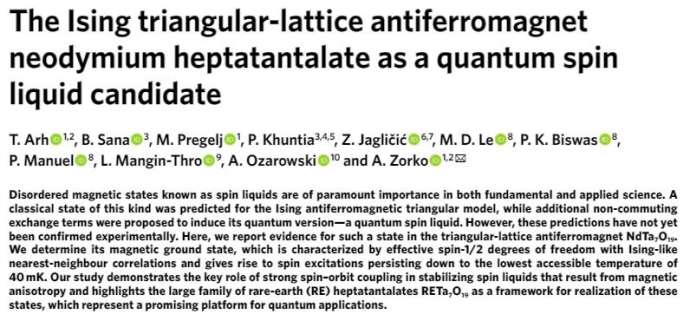STA, 5 January 2022 - A group of physicists at the Jožef Stefan Institute confirmed the spin liquid state even at absolute zero temperatures, as first predicted by Swiss physicist G.H. Wannier in 1950, but his wish for experimental confirmation has remained unfulfilled until now. The achievement was published in the Nature Materials journal.
Spin liquids are a special magnetic state of matter. They are the magnetic analogue of the liquid state of matter, in that the magnetic moments (spins) are disordered, but at the same time already strongly correlated.
Swiss physicist Gregory Hugh Wannier first predicted in 1950 that the spin liquid state can be present even at absolute zero temperature. This has now been confirmed by Slovenian scientists.
The project involved physicists from the Jožef Stefan Institute - Tina Arh, Matej Pregelj and Andrej Zorko, together with colleagues from the Institute of Mathematics, Physics and Mechanics and other research institutions in India, the UK, France and the USA.
The key to their breakthrough was the study of a magnetically unexplored compound, using a wide range of complementary experimental techniques, the Jožef Stefan Institute said.
Andrej Zorko explained for the STA that the team was studying the magnetic properties of a certain crystal, neodymium heptatantalate, and added that from a magnetic point of view, it is possible to draw analogies with states of matter.
The magnetic moments (spins) at sufficiently low temperatures can typically arrange like building blocks in the solid state of matter, while at high temperatures, they will each point in their own direction, like in the gaseous state of matter.
Spin liquids are somewhere in between, they are the magnetic analogue of the liquid state of matter, Zorko said. "That the spins in a spin liquid do not arrange themselves in the same direction, even at absolute zero, is like water never turning into a crystal or solid matter when cooled."
Beyond the scientific aspect, this discovery could be potentially important in the light of modern quantum technologies, as spin liquids are considered to be one of the most promising platforms for storing information in quantum computing, Zorko concluded.
You can find the paper here







